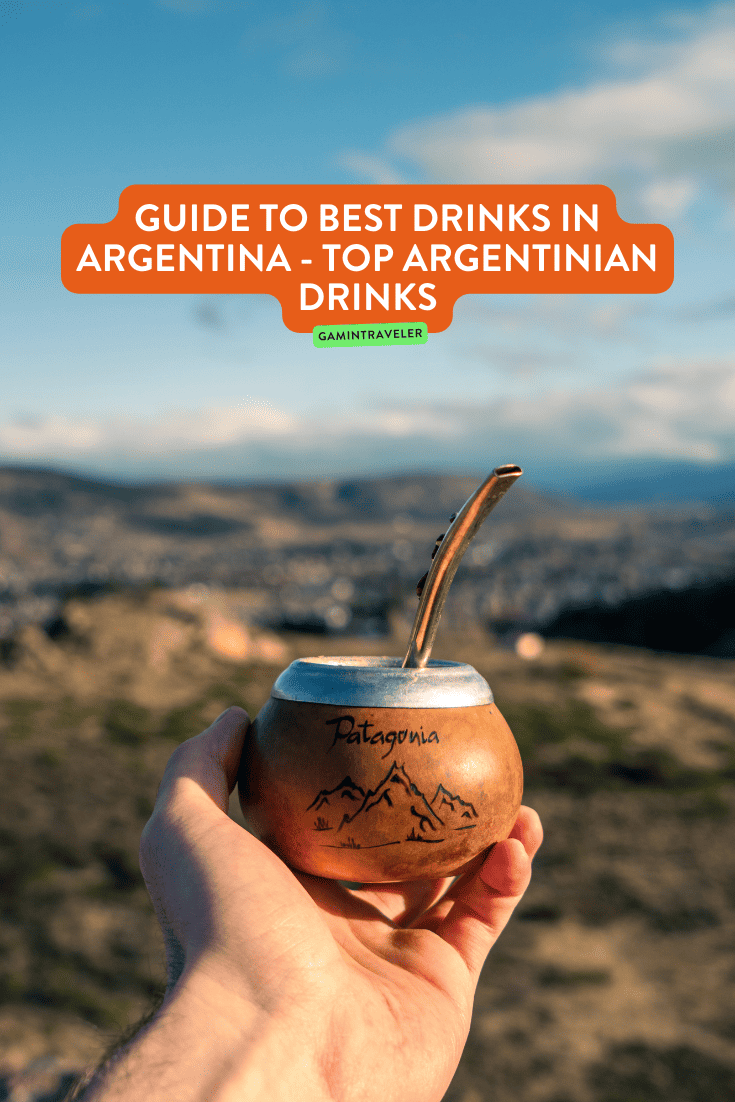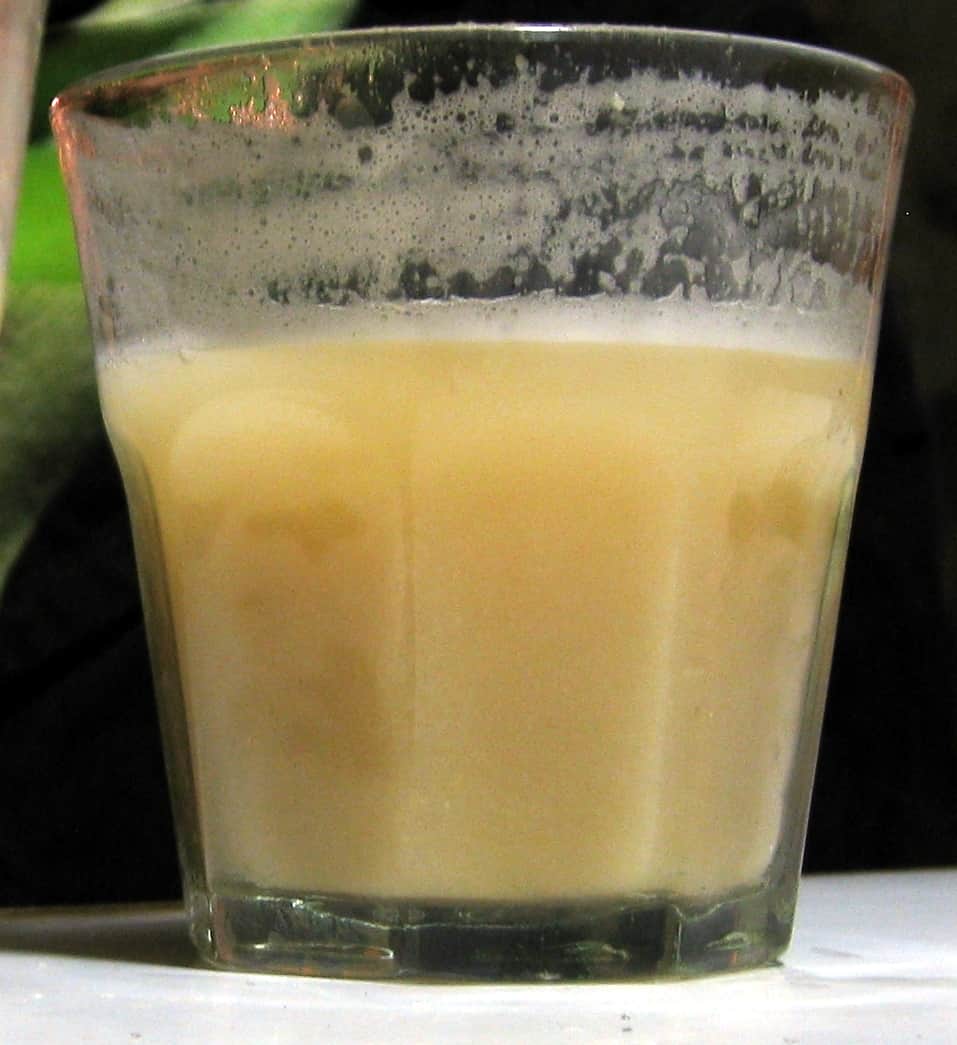Last updated on November 12th, 2023 at 11:50 pm

Discovering traditional drinks in Argentina (traditional Argentinian drinks) like yerba mate, chicha, agua de valencia, and wines like Malbec that you need to try when visiting Argentina – let’s dive into this post.
Argentina, often celebrated for its rich culture and world-class landscapes, also boasts a beverage scene that’s just as diverse and captivating. From wines that are envy of the globe to local brews and traditional infusions, Argentina’s drinks tell tales of history, tradition, and passion. Dive deep into this comprehensive guide to fully experience Argentina, one sip at a time.
Related Travel Guides:
- Best Argentina eSIM for Travel
- Breakfast in Argentina to Try
- Best Argentinian Food to Try
- Where to stay in Buenos Aires
- Recommended Travel Insurance for Travel in Argentina
Argentina’s Wine Legacy (on Drinks in Argentina)
Malbec from Mendoza: The flagship grape of Argentina, Malbec from the Mendoza region is full-bodied, with rich flavors of plum and blackberry. It pairs excellently with Argentina’s famed beef.
Torrontés: Native to Argentina, this aromatic white wine boasts flavors of peach, rose petals, and lemon zest. Salta region’s high altitude vineyards produce the finest Torrontés.
Other Varietals: Beyond Malbec and Torrontés, Argentina also produces commendable Cabernet Sauvignon, Syrah, and Bonarda.
1. Malbec from Mendoza
Malbec is not just a grape in Argentina; it’s a representation of the country’s wine culture. Originating from the Bordeaux region of France, this grape found its true home in the sun-drenched landscapes of Mendoza. It thrives in the shadow of the Andes, drawing from the unique terroir to develop deep, robust flavors. The Mendoza Malbec stands out for its deep purple hue, aromas of ripe fruits, and velvety texture. On the palate, expect rich flavors of plum, blackberry, and a hint of chocolate. Given its robust character, Malbec is the ideal companion for Argentina’s succulent steaks, particularly those grilled to perfection in the traditional asado manner.
2. Torrontés
If Malbec is the king of Argentine reds, Torrontés can be seen as the queen of whites. Exclusively Argentine, this grape doesn’t grow with such character and aroma anywhere else in the world. The wine it produces is known for its intense aroma, reminiscent of roses, geraniums, peach, and lemon zest. Two primary regions in Argentina are known for their Torrontés – La Rioja and Salta, with Salta producing arguably the most aromatic and elegant versions due to its high-altitude vineyards. Refreshing and crisp, Torrontés pairs wonderfully with seafood, salads, and even spicy Thai or Indian dishes.
3. Cabernet Sauvignon
While Malbec takes much of the limelight when it comes to Argentine wine, the country’s Cabernet Sauvignon should not be overlooked. These wines often showcase a ripe fruit profile with notes of blackcurrant, cherry, and sometimes even bell pepper. Depending on the aging process, one might also detect hints of cedar, vanilla, or chocolate. These wines are fantastic with hearty dishes like lamb or beef, or even hard cheeses.
4. Syrah
Also known as Shiraz in other parts of the world, Syrah in Argentina often combines the best features of its French and Australian counterparts. Argentine Syrah is typically full-bodied and packed with flavors of dark fruits, along with spicy, peppery, and sometimes smoky notes. Regions like San Juan are producing particularly noteworthy Syrahs that are both complex and delightfully drinkable.
5. Bonarda
For a long time, Bonarda was the most planted grape in Argentina until Malbec claimed that title. Despite its reduced acreage, Bonarda continues to produce intriguing wines, known for their bright fruit flavors, moderate tannins, and often a hint of smokiness. It’s a great wine to pair with grilled meats and pasta dishes.
6. Chardonnay
While Argentina is globally recognized for its red wines, its white wines, particularly Chardonnay, are gaining acclaim. From the cooler regions of Mendoza and Patagonia, Argentine Chardonnays often have a bright acidity combined with flavors of green apple, pear, and sometimes a hint of oak. These wines pair beautifully with chicken dishes, creamy sauces, or seafood.
In the vast landscapes of Argentina, the confluence of Andean water, high-altitude sunlight, and passionate winemaking results in these incredible wines. Each sip is a testament to the country’s dedication to viticulture and its rich wine heritage.
7. Yerba Mate: A National Obsession (on Drinks in Argentina)

A traditional drink made from the dried leaves of the Ilex paraguariensis plant, Yerba Mate is more than just a drink – it’s a cultural ritual. Served in a hollow gourd with a metal straw, it’s an emblem of social connection and friendship.
Craft Beers & Cervezas
While Argentina’s beer scene was traditionally dominated by larger breweries, the craft beer movement has taken hold, especially in regions like Patagonia. Popular brews include IPAs, stouts, and red ales.
8. Fernet with Coca: The Unexpected Pleasure

Originating from Italy, Fernet became incredibly popular in Argentina, especially when mixed with Coca-Cola. The bitter herbaceousness of Fernet balances with the sweet cola, making it a favored drink for many locals.
Argentina’s Signature Cocktails (on Drinks in Argentina)
9. Clericó
A refreshing punch made from a mix of fresh fruits, sugar, and wine, often enjoyed during summer.
10. Lagrima
Made from a dash of vermouth and topped with soda, it’s a simple yet satisfying drink.
Non-Alcoholic Traditional Drinks (on Drinks in Argentina)

11. Chicha
A fermented corn beverage with its roots in indigenous cultures, Chicha is sweet with a slightly tangy kick.
12. Agua de Valencia
A mix of fresh orange juice, sugar, and soda water, perfect for cooling off in the summer heat.
Tips for Responsible Drinking in Argentina
- Age Restrictions: The legal drinking age in Argentina is 18.
- Stay Hydrated: Argentina’s climate, especially in its wine regions, can be quite dry. Always balance your alcohol intake with water.
- Know Your Limits: Argentine wines, especially, can be deceptively strong. Pace yourself.
FAQs on Drinks in Argentina
1. Is it customary to tip in Argentine bars?
In Argentina, tipping, or propina as it’s locally known, is indeed a practice, but it’s different from many other countries. In bars, while it’s not obligatory to leave a tip, it’s a gracious gesture. If you’ve received good service, or if a bartender has gone out of their way to make your experience special, leaving a tip is a way to show your appreciation. Typically, patrons might leave around 10% of the bill, but this can vary based on the setting and the service. If you’re in doubt, just observe what locals are doing or ask someone trustworthy.
2. Can I join wine tours in Mendoza?
Yes, Mendoza, the heartland of Argentina’s wine country, offers a plethora of wine tours catering to every kind of wine enthusiast. Whether you’re a seasoned connoisseur or someone just starting to develop a palate for wine, there’s something for everyone.
- Large-scale Wineries: These are the giants of Argentina’s wine production. On tours of these establishments, you’ll get to see the vast expanses of vineyards and understand the large-volume wine-making process. These wineries often have state-of-the-art facilities and offer structured tastings.
- Boutique Vineyards: For those who prefer a more intimate experience, boutique vineyards are the way to go. These smaller operations often produce limited batches of premium wines. The tours here can be more personalized, allowing you to engage directly with the wine-makers and understand their unique processes and philosophies.
- Themed Tours: Mendoza also offers a variety of themed tours. Whether you’re looking to cycle through vineyards, enjoy wine pairings with gourmet meals, or delve deep into the world of Malbec, there’s a specialized tour for it.
When booking a wine tour, it’s recommended to do some research or ask for recommendations. This way, you can find an experience that aligns best with your interests and preferences.
3. Is it safe to drink tap water in Argentina?
While tap water is generally safe to drink in many parts of Argentina, especially in major cities like Buenos Aires, it’s always wise to ask locals or your accommodation provider about the water quality in the specific region you are visiting. In some rural areas or close to natural bodies of water, bottled water might be recommended.
4. What are the legal drinking ages in Argentina?
The legal drinking age in Argentina is 18. This applies to the purchase and consumption of alcohol. It’s always a good idea to carry some form of identification, like a passport or a copy of it, especially if you appear young.
5. Are there non-alcoholic traditional Argentine drinks I should try?
Certainly! Mate is a traditional Argentine drink made from the dried leaves of the yerba mate plant. It’s a communal drink, often shared among friends and family, and has a distinctive, acquired taste. Another popular non-alcoholic beverage is chicha, a fermented drink made from corn or other grains. Both are deeply rooted in Argentine culture and are worth trying during your visit.
Understanding the local customs and nuances can greatly enhance your drinking experience in Argentina. Whether you’re toasting with a glass of premium Malbec or sharing a traditional mate, Argentina offers a rich tapestry of flavors and traditions waiting to be explored.
Final Thoughts on Drinks in Argentina
Whether you’re trying alcoholic drinks in Argentina or any other Argentinian drinks
Argentina’s drink culture is an enticing blend of tradition and innovation. To truly understand the heart and soul of this nation, immerse yourself in its beverages. Whether you’re sipping a handcrafted Malbec against the backdrop of Andean mountains or sharing a gourd of Mate amongst new friends, each drink is a journey through the country’s rich tapestry of history and culture.
About the Author: Ruben, co-founder of Gamintraveler.com since 2014, is a seasoned traveler from Spain who has explored over 100 countries since 2009. Known for his extensive travel adventures across South America, Europe, the US, Australia, New Zealand, Asia, and Africa, Ruben combines his passion for adventurous yet sustainable living with his love for cycling, highlighted by his remarkable 5-month bicycle journey from Spain to Norway. He currently resides in Spain, where he continues sharing his travel experiences with his partner, Rachel, and their son, Han.
